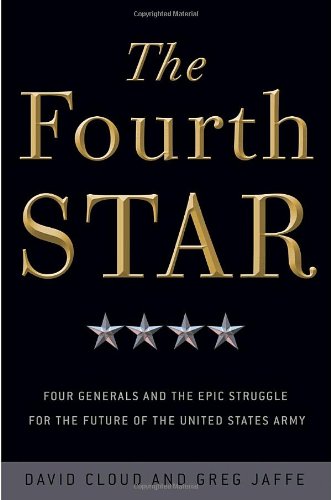
The Fourth Star
Four Generals and the Epic Struggle for the Future of the United States Army
کتاب های مرتبط
- اطلاعات
- نقد و بررسی
- دیدگاه کاربران
نقد و بررسی

August 15, 2009
Admiring, insightful biographies of four generals who commanded in Iraq.
John Abizaid led the Central Command (which oversees both Iraq and Afghanistan) from 2003 until 2007. David Petraeus led the Multinational Force Iraq—the actual fighting forces, almost all American—until he took over Central Command in 2008. Both former Multinational Force leaders, George Casey now serves as Army Chief of Staff and Peter Chiarelli as Vice Army Chief of Staff. As the first post–Vietnam War generation, they are working to ensure a better outcome from today's wars. In their first book, journalists Cloud and Jaffe emphasize that the jury is still out. They stress that the military hated its experience in Vietnam so intensely that it refused to learn from it, happily resuming training for a traditional war against massive Soviet forces. The wildly expensive build-up under President Reagan—and again after 9/11—mostly produced high-tech tanks, ships, planes and missiles. As the authors recount the careers of these men, readers will be impressed with their scholarship (all earned advanced degrees), fierce ambition and yearning to command in combat. All studied history and all experienced firsthand irregular wars in places like Kosovo, Somalia and El Salvador. Taking command in Iraq, they understood that they were not fighting by conventional standards. Readers may find it ironic to learn that their frustrations suppressing the insurgency owed less to military conservatism than to their civilian commanders, with President Bush certain that free elections would solve Iraq's problems and Secretary of Defense Rumsfeld (who disagreed) warning them that"nation building" was not America's goal.
No more optimistic than other accounts of recent bungling by the American military, but a perceptive look at intelligent, capable generals trying their best.
(COPYRIGHT (2009) KIRKUS REVIEWS/NIELSEN BUSINESS MEDIA, INC. ALL RIGHTS RESERVED.)

October 15, 2009
The fall of Saigon in 1975 left the U.S. Army defeated, demoralized, and divided. It was an army torn apart internally, rife with drug and alcohol use and soldiers who didn't want to serve in it. This work is about four young officers just beginning their respective careers in the late 1960s and early 1970s: Generals George Casey, Peter Chiarelli, John Abizaid, and David Petraeus. They all helped not only to rebuild the army but also to rethink its role in modern warfare. In doing so, they became the army's most influential general officers in the war in Iraq. This should be on the shelf next to Thomas E. Ricks's "Fiasco: The American Military Adventure in Iraq" and his follow-up, "The Gamble: General David Petraeus and the American Military Adventure in Iraq, 20062008". Recommended. [See Prepub Alert, "LJ" 6/15/09.]
Copyright 2009 Library Journal, LLC Used with permission.

October 1, 2009
Two seasoned defense journalists impressively profile four generals who have earned the fourth star, thus the highest rank in the U.S. Army, in Iraq. John Abrazaid possesses insight afforded by family ties to the Middle East. George Caseys father was a general killed in Vietnam, and he is filled with the determination not to let Iraq collapse as Vietnam did. Peter Chiarelli may remind some of George Patton, but he pushes himself as well as his men and his superiors to the limit. David Petraeus, the best known of the four, simply pushes the rethinking of methods wherever he finds that it isnt being done. The careers of the four suggest that the modern army is far more capable of rewarding innovation than it was in the Vietnam era, which is good news for national security. The book also deals a blow to any monolithic conception of the military mind, a balloon that cannot be deflated too often.(Reprinted with permission of Booklist, copyright 2009, American Library Association.)

























دیدگاه کاربران